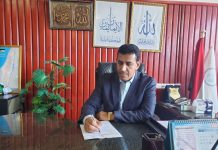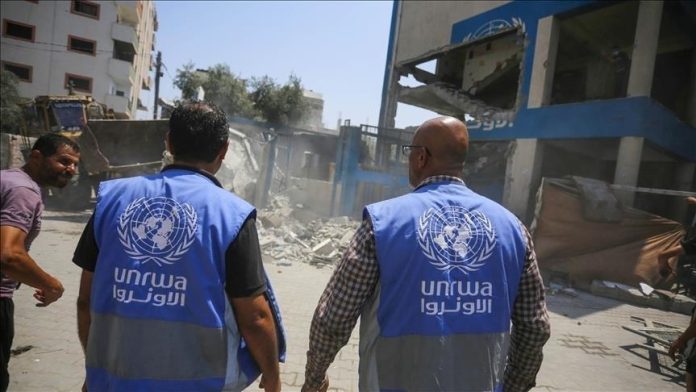With the Israeli enemy’s decision to cut ties with the United Nations Relief and Works Agency for Palestine Refugees (UNRWA) coming into effect last Thursday, UN and international warnings have been issued, stating that implementing this decision will have catastrophic consequences on the lives and future of Palestinian refugees.
In a new escalation of international rejection of the Israeli entity’s decision to ban UNRWA’s operations, the Russian Foreign Ministry condemned this move.
In a statement issued on Saturday, the Russian Foreign Ministry said: “These arbitrary measures, which carry the most severe humanitarian consequences for the Palestinians, are deeply disappointing and deserve condemnation.”
It added: “Moscow is convinced that UNRWA’s mission, which has for decades been the primary source of support for Palestinians in the occupied territories and neighboring countries, must continue.”
The Belgian government also announced its opposition to this step, expressing deep regret over the expulsion of the agency from East Al-Quds and the banning of its operations.
It called on the Israeli entity to reverse the implementation of the law passed by the Knesset, which threatens to exacerbate the humanitarian crisis in the Gaza Strip.
In a statement, the Belgian Foreign Ministry said: “Belgium deeply regrets the expulsion of UNRWA from East Al-Quds and the ban on its operations. We call on Israel to reverse the implementation of Knesset laws. The humanitarian aid provided by UNRWA is indispensable and cannot be replaced.”
For his part, the Icelandic Foreign Minister expressed his country’s regret over the Israeli entity’s decision to ban UNRWA, noting that supporting the agency is crucial for achieving the required ceasefire in Gaza, supporting Palestinian refugees, and promoting regional stability.
In response to the Israeli entity’s decision, seven UN Security Council member states issued a joint statement condemning the move. The statement was released by Belgium, Ireland, Luxembourg, Malta, Norway, Slovenia, and Spain.
The group stated in their joint statement: “We condemn Israel’s withdrawal from the 1967 agreement between Israel and UNRWA and any attempt to obstruct its ability to operate and fulfill its mandate from the UN General Assembly.”
The statement emphasized that “UNRWA remains more important than ever, as it serves as the backbone of the humanitarian response in Gaza and is indispensable for implementing the ceasefire, allowing for the expansion of much-needed humanitarian relief for thousands of Palestinian refugees and civilians.”
Earlier, the United Kingdom, France, and Germany expressed deep concerns over the implementation of the new law, warning that its repercussions would be severe, particularly in the Gaza Strip, which heavily relies on humanitarian supplies passing through the occupied Palestinian territories.
The Parliamentary Assembly of the Council of Europe, for its part, emphasized the necessity for UNRWA to continue fulfilling its duty in the region. It adopted a resolution in the General Assembly calling for an immediate end to the humanitarian crisis affecting children, women, and detainees in Gaza as a result of genocide.
UN Secretary-General António Guterres called on the Israeli entity to withdraw the law preventing UNRWA from operating, stressing that “there is no alternative to it.”
In media statements, Guterres warned that banning UNRWA could have dire consequences for Palestinians in Gaza.
Meanwhile, UNRWA spokesperson Jonathan Fowler cautioned that terminating the agency’s operations in the occupied West Bank, particularly in East Jerusalem, would lead to the collapse of essential services relied upon by thousands of Palestinian refugees, including patients and students.
Fowler emphasized that the lack of real alternatives would turn UNRWA’s exclusion into a humanitarian catastrophe, worsening the suffering of refugees.
He added that “UNRWA remains committed to staying and providing services, but practical challenges and uncertainty mean that our operations could be severely affected.”
Fowler further highlighted that “UNRWA’s complex in East Jerusalem is protected under the 1946 Convention on Diplomatic Premises and enjoys special privileges and immunities.”
UNRWA Commissioner-General Philippe Lazzarini, addressing the UN Security Council, warned that disrupting the agency’s operations would threaten the ceasefire in Gaza and worsen the humanitarian crisis.
Lazzarini accused the Israeli government of launching an aggressive disinformation campaign against UNRWA, revealing that “$150 million has been invested in propaganda efforts aimed at discrediting the agency.”
He stressed that UNRWA is under political attack to strip Palestinians of their refugee status and unilaterally reshape the terms of a political solution.
Lazzarini asserted that Palestinian refugees’ rights, including the right of return, do not depend on UNRWA’s existence but are inherent rights that cannot be denied. He clarified that “the elimination of UNRWA does not mean the elimination of the right of return.”
He concluded his speech by reaffirming UNRWA’s commitment to continuing its services despite mounting pressure and challenges, stressing that the agency’s future is closely tied to regional stability and the pursuit of a lasting political solution to the Palestinian issue.
Despite the Israeli law taking effect, the UN agency confirmed that it continues to provide services in the occupied West Bank and Gaza Strip, emphasizing that its role remains indispensable.
UNRWA’s Director of Communications, Juliette Touma, stated during a press conference in Geneva on Friday: “We are continuing to provide services. In Gaza, UNRWA remains the backbone of the international humanitarian response. We still have international staff on the ground, and we continue to bring in trucks loaded with essential supplies.”
Touma warned that any disruption to the agency’s operations in Gaza could undermine the ceasefire agreement between the Israeli entity and Palestinian resistance, stating: “If UNRWA is not allowed to continue delivering and distributing supplies, the fragile ceasefire will be at risk.”
In East Jerusalem and the West Bank, UNRWA staff are facing increasing challenges due to escalating Israeli actions against them.
Touma noted that employees have been subjected to harassment, including being stopped at checkpoints and pelted with stones, amid an ongoing disinformation campaign against the agency.
She added: “Our team is operating in an exceptionally hostile environment. It is a very difficult mission, and our staff do not receive adequate protection.”
Touma also confirmed that some international staff had to leave the Palestinian territories after their visas expired, further complicating the agency’s operations under current conditions.
On October 28, 2024, the Israeli Knesset passed a law in its second and third readings banning UNRWA’s activities, disregarding international warnings that such a move violates international treaties and laws.
The law stipulates that “UNRWA shall not operate any representative office, provide any services, or engage in any activities, directly or indirectly, in the occupied Palestinian territories.”
According to the law, the 1967 agreement allowing UNRWA to operate in the occupied Palestinian territories will be revoked, its activities will be halted, and any contact between Israeli officials and UNRWA employees will be prohibited.




















